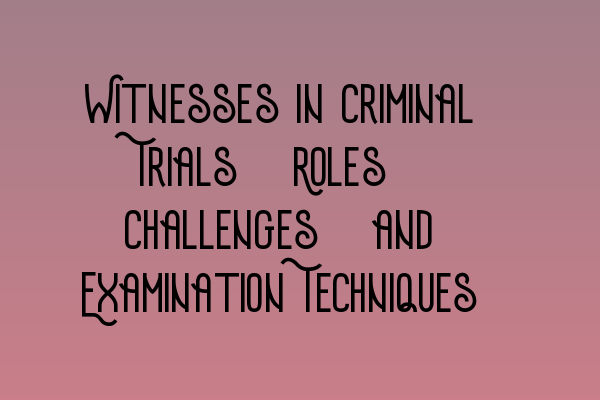Witnesses in Criminal Trials: Roles, Challenges, and Examination Techniques
In criminal trials, witnesses play a crucial role in the administration of justice. They provide testimony and evidence that can determine the guilt or innocence of the accused. However, being a witness in a criminal trial can be challenging and intimidating. This blog post will explore the roles and challenges faced by witnesses, as well as the examination techniques used to elicit accurate and reliable testimony.
The Roles of Witnesses
Witnesses in criminal trials have several important roles. Firstly, they are responsible for providing factual information about the events they witnessed. Their testimony helps to establish a timeline of events and provides insight into the circumstances surrounding the alleged crime. Secondly, witnesses can provide expert opinion or specialized knowledge in certain cases. Expert witnesses, such as forensic scientists or psychologists, offer insights that aid in the interpretation of evidence. Lastly, witnesses also serve as a check on the fairness of the trial process. Their presence ensures transparency and accountability in the administration of justice.
Challenges Faced by Witnesses
Being a witness in a criminal trial can be a daunting experience. Witnesses may face challenges such as fear, intimidation, and pressure to withhold or alter their testimony. The emotional and psychological impact of testifying can also be significant. Witness credibility can be undermined through aggressive cross-examination or attempts to discredit their character. These challenges can have a negative impact on witnesses’ willingness to come forward and testify truthfully, potentially hindering the pursuit of justice.
Examination Techniques
To ensure reliable and accurate testimony, effective examination techniques are employed during the trial process. The examination of witnesses can be categorized into direct examination and cross-examination. During direct examination, the examining party, typically the prosecutor, elicits the witness’s testimony in a controlled and structured manner. The examiner asks open-ended questions that allow the witness to provide a narrative and share important details. This technique helps to establish the facts and narrative of the case in a clear and coherent manner.
Cross-examination, on the other hand, involves questioning the witness by the opposing party, usually the defense counsel. The purpose of cross-examination is to challenge the witness’s credibility, test their memory and perception, and uncover any inconsistencies or biases. The defense counsel may use leading questions or confrontational techniques to elicit different responses from the witness. However, cross-examination must adhere to legal and ethical boundaries to ensure a fair trial.
It’s important to note that effective examination techniques require legal expertise and skill. Lawyers specializing in criminal law should undergo comprehensive training and preparation, such as SQE 1 preparation courses, to develop their examination skills and master the art of questioning witnesses.
